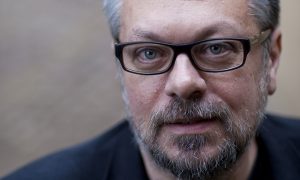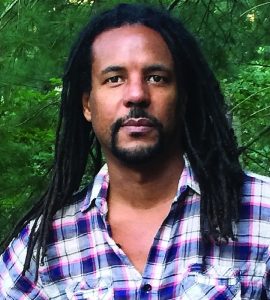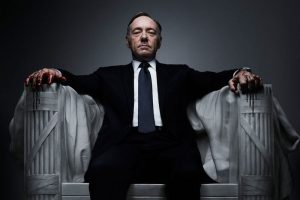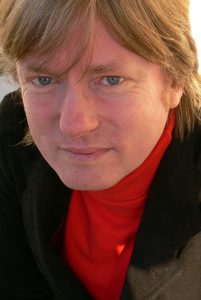Writers Unlimited could hardly have chosen a more appropriate theme for this year's literary festival Winternachten: Is this the real life? That question will be on many a mind when the new president of the United States is inaugurated on Friday. Fortunately, some eighty writers are gathering in The Hague who do have something sensible to say about the state of the world and the social issues we are all facing. Ten reasons to brave the cold the coming days and go to Winternachten.

1. You think others deserve as much freedom of speech as you do. Especially now.
As usual, the opening night on Thursday is dedicated to freedom of expression. This year, the Free the Word! speech will be given by Russian writer Mikhail Shishkin, a prominent author in contemporary Russian literature. Afterwards, the Oxfam Novib PEN Awards will be presented to authors - the winners will be announced only shortly before the festival - who today seek and propagate truth with their work at the risk of their lives and freedom. An important award, then, because worldwide, very many writers and thinkers are still kept on a leash or suppressed - read later this week, for instance, the interview with one of last year's Winternachten guests, Egyptian writer Alaa al Aswani. These writers deserve support.
Thursday 19 Jan, Theater aan het Spui (Room 1), 20:00-22:00.

2. Donald Trump will be America's new president. And we will also have elections here.
While according to CNNI polls only 40 per cent of Americans are satisfied with how Donald Trump is doing at the moment, on Friday he will become the 45e president of the United States. The Late Night Show on Friday is therefore about the America that is tearing at many edges, of the shrinking middle class, of divisions between white and black, of hopeful new immigrants an embittered touched white underclass. And the question of what we will notice of this in Europe. Is the turnaround in America a harbinger of what will happen in the elections in the Netherlands, France and Germany? Arnon Grunberg, Christine Otten, Colson Whitehead, Margriet Oostveen and many others address these and other questions in This is Not America (part 1) and It is Not America Here (part 2).
Friday 20 Jan, Theater aan het Spui (Room 1), 22.15-22.55 and 23.00-23.45.
3. At Winternachten, important social questions are asked and answered.
The Hague festival is really about something and also dares to touch on uncomfortable or spicy topics - while remaining a very cosy festival. This year's theme is: Is this the real life? So the programme sections are about what is there but remains hidden. And about fake: what is not there but is held up to us. Or in the words of programme maker Shervin Nekuee: 'Against the rosy advertising image of the happy consumer or entrepreneur, operating freely and whistling in his marketplace, there is another reality. That of a political community at the crossroads of big questions: how to deal with the millions of refugees coming to Europe; with what words and what weapons to respond to the terrorist attacks; how to relate to the return of populist politics and the global return of the penchant for the strong leader - from America to Turkey and Russia. And - last but not least - what to do about our own agoraphobia and xenophobia in times of globalisation?'
Questions like these are addressed in, among others, the programme section 'In the Mirror of Refugees', which deals with the fiction of Europe that refugees find once they get there. Guests at the table are: Tommy Wieringa, who, for his novel These are the names delved into the motivations of refugees; the German-Azerbaijani Olga Grjasnowa, who wrote about displaced people in a globalised world. Russian writer Mikhail Shishkin, who spent years in Vienna interpreting for asylum seekers, which he incorporated into his novel Venus Hair, and novelist and filmmaker Hassan Blasim, who fled from Iraq to Finland.
Friday 20 Jan, Theater aan het Spui (Room 1), 21.15-22.10.

4. Because you love not only books, but also House of Cards.
As America welcomes its new president, Winternachten Festival explores that fictional president in House of Cards: Frank Underwood. Philosopher Tom Dommisse, who wrote an article about it, talks to Filmhuis Den Haag programme maker Gerlinda Heywegen and politician Felix Rottenberg about politics and fiction using excerpts from the popular series. How is politics portrayed in the Netflix hit series and what image of themselves do the real Underwoods create? What impact does this have on how we think about politics? If you want to know, visit 'Power is always right. The lessons of House of Cards'.
Friday 20 Jan, Film House (Room 1), 8pm-8.50pm.
5. Because you dare to look in the mirror.
'The world is a story we tell ourselves about the world,' said Indian writer Vikram Chandra. On social media, this fact is magnified: we post success stories and the most beautiful (photoshopped) photos. Thus, the world is not only a story we tell ourselves about the world, but also a story we tell the world about ourselves. Hanna Bervoets took Chandra's quote as the motto for her novel Efter, in which she explores the stories we tell ourselves and each other to get a grip on our environment. Mirror Mirror on the Wall is about the fairy tales we tell each other and ourselves.
Friday 20 Jan, Theater aan het Spui (Room 2), 22.00-22.55.
6. A Late Night Show about IS - when do you experience that?
The Islamic State is moving over corpses, and the world cannot close its eyes to that. In its programme sections 'IS: The Horror Show' and 'IS: the retort', Saturday night's Late Night Show deals with all facets of the IS. Iraqi-born writer Hassan Blasim, according to British newspaper The Guardian 'perhaps the greatest living writer of Arabic fiction', reads from his collection of short stories The Corpse Exhibition (Corpse exhibition). In it, he outlines daily life in contemporary Iraq in vivid, penetrating and violent narratives, but also shows the surreal, humorous and enchanting sides of his characters. Journalist Hassnae Bouazza talks to Blasim, political commentator and writer Ian Buruma and Arnon Grunberg about the theatrically staged murderous acts the bombastic horror-pathos of IS. Arnon Grunberg and Frank Westerman address the question of what is the right response to IS's horror campaign and propaganda machine.
Saturday 21 Jan, Theater aan het Spui (Room 1), 22.15-22.55 and 23.00-23.45.

7. Rather fiction as an act of resistance than gunplay
Writers tend to take up the pen rather than the sword to fight injustice. Fiction is their ideological act. This is what American writer Colson Whitehead, Bolivian author Rodrigo Hasbún, Romanian Mircea Cărtărescu and Uruguayan born and raised writer Carolina Trujillo discuss. Whitehead shows in The underground railway slave Cora speaking in the so-called land of freedom America. Hasbún wrote a novel about the daughter of a Nazi who becomes a guerrilla fighter in South America. Cărtărescu makes his characters sigh under the communist yoke and escape into literature and the past, while Dutch Carolina Trujillo describes an underworld full of drugs and dealers in Montevideo, where a former guerrilla fighter was president until 2015.
Saturday 21 Jan, Theater aan het Spui (Room 2), 21.45-22.55.
8. Because you Under the Skin had not yet read, but still want to be able to participate.
His novel was critically acclaimed and beautifully filmed starring Scarlett Johansen. It rained five stars for book and novel. Then we are talking about Under the Skin by Australian-born author Michel Faber, who was born in the Netherlands and lives in Scotland. The story is about a mysterious woman who traverses Scotland in a van and accosts unsuspecting random passers-by, only to seduce and trap them. In case you haven't read the book, here's your chance, because not only will Michel Faber come and talk about his novel and his love of film adaptations, but Michael Glazer's film will also be screened.
Saturday, Jan 21, Film House (Room 1), talk 8.55pm-21.55pm, film 10pm-23.50pm.

9. You are through all your books and would like to know what to read next.
In the familiar programme section 'The book of my life', the writers who will be guests at the festival will talk about their favourite book. An ideal opportunity to hear their enthusiastic stories and get a lot of inspiration yourself. With, among others, Bas Heijne, Rodrigo Hasbún and Mircea Cărtărescu (Friday), Marieke Rijneveld, Tommy Wieringa and Colson Whitehead (Saturday).
Friday and Saturday, continuous, Filmhouse Studio.
10. You want to collect a lot of signatures at once.
As always, Winternachten closes with the Writers' Festival, a festive programme around the presentation of the Jan Campert Prizes, the literature prizes awarded by the municipality of The Hague. Various writers, poets and musicians will perform. Writer Karin Amatmoekrim gives her vision on 'The State of Dutch Literature'. Jan Baeke receives the Jan Campert Prize for his book of poetry Seasonal gossip, in which video artist Alfred Marseille delivers a eulogy in the form of a short film. Cabaret artist Katinka Polderman addresses Anton Valens, who receives the F. Bordewijk Prize for his novel The compost circulation plan. Benno Tempel, director of Gemeentemuseum Den Haag, delivers the eulogy for Kees 't Hart, who receives the J. Greshof Prize for the collection of essays The happy writing. The highlight of the afternoon is the presentation of the Constantijn Huygens Prize for an entire body of work, which this year is awarded to Atte Jongstra. He will be addressed musically by trumpeter Eric Vloeimans, and receive a eulogy from Max Pam. Young Flemish poet Charlotte Van den Broeck reads some of her poems.
Sunday 22 Jan, Theater aan het Spui (Room 1), 14:00-16:30.
